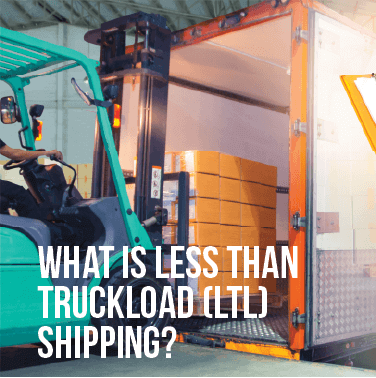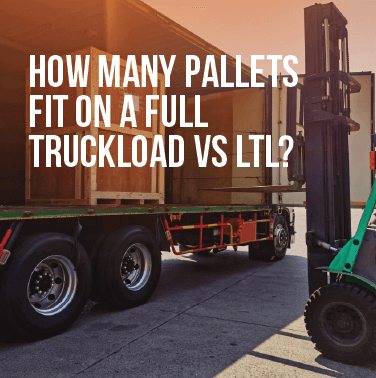When it comes to freight shipping, there’s a lot to consider. How many pallets do you need shipped? How long will it take to ship your cargo? How much does it cost? These are all questions you should ask yourself when deciding between FTL vs LTL freight shipping.
Full truckload, or FTL shipments, occupy most of or the entire space of a trailer. Alternatively, LTL, or less than truckload shipments only fill up a small portion of a truck. FTL shipping is typically faster than LTL since a truck doesn’t have to make frequent delivery stops. However, LTL is typically less expensive.
Our guide details everything you need to know about LTL and FTL shipping, like advantages and disadvantages between the two, how many pallets fit on each, and more.
As the name implies, full truckload shipping refers to cargo that takes up an entire truckload (or at least close to it). More importantly, it means that your freight will be the only cargo on the truck.
During FTL shipping, a shipment will typically be taken straight to its destination for delivery. There are no detours or stops to unload any part of the shipment. This makes full truckload shipping a fast, safe and efficient delivery method.
Contrary to its name, full truckload shipping does not mean that a shipment actually has to take up an entire truckload’s worth of space. FTL simply means that a customer is paying for the entire trailer and they have the entire space available for their shipment.
That being said, FTL shipping often does use an entire truckload’s capacity. The amount of cargo that can fit on a truckload depends on the size of the trailer being used, the cargo being transported, whether the freight is palletized or floor-loaded, and a number of other variables. Typically, a “full” truckload is a shipment that consists of 24-30 pallets.

Less than truckload, also like the name implies, refers to a shipping method in which your freight only takes up a portion of the trailer space, rather than the whole thing. One of the key characteristics of LTL is that freight from multiple sources shares the same space.
During LTL shipping, a truck often has to make multiple stops throughout its route for each shipment. At each stop, cargo may have to be unloaded and reloaded if not yet ready for delivery. While this is more cost-effective, it results in a slower and slightly less safe trip for the freight shipments.
Another important thing to know about LTL freight is that it comes in freight classes. The classification system is used by the NMFTA (National Motor Freight Traffic Association) to categorize cargo and determine pricing. There are 18 classes of LTL freight, ranging from Class 50 (least expensive) to Class 500 (most expensive).
Each method of freight shipping comes with its own distinct advantages and disadvantages. The main differences between full truckload and LTL come down to factors like speed of delivery, cost savings, and safety of the freight during travel.
One of the biggest pros of FTL freight is that this method is often faster than LTL shipping due to the number of different customers that share trailer space using each method.
With full truckload shipping, your cargo will be the only freight taking up trailer space. As the only shipment on the truck, the carrier can proceed directly to its final destination, making for a fast and efficient delivery.
On the other hand, multiple shipments share the same trailer during LTL shipping. As a result, the truck may need to stop at a distribution center where the various shipments will be split into additional trucks for final delivery. Additionally, the truck may make stops at multiple destinations to deliver each shipment before reaching your destination. The additional detours and stops can slow the entire process down, resulting in longer transit times.
When it comes to freight shipping, one of the main costs involved is the amount of truck space taken up by a shipment.
FTL shipping means that only one shipment is involved. That means that only one customer is paying for the capacity of the entire trailer. While that amount of space is often required for customers shipping by full truckload, it can be more expensive than sharing the space with others.
LTL carriers are cheaper because you only pay for the space that your goods take up. Multiple shipments will share the same trailer, meaning the cost of the entire trailer is split among each of the different shipments.
For the same reason that FTL has the advantage over less than truckload when it comes to delivery time, full truckload is also a safer delivery method for the cargo on board.
A shipment sent by full truckload will travel directly from point A to point B. The freight doesn’t leave the trailer until it is being unloaded for final delivery. In this situation, you can have peace of mind knowing that there are very few opportunities for your cargo to be lost or damaged during the shipping process.
One of the big cons of LTL is that shipments will often have to make multiple stops, being unloaded and reloaded each time. The more times that freight is handled throughout the delivery process, the higher the chances that your freight can be lost or damaged.
| Full Truckload | Less than Truckload | |
| Speed | ✔️ | |
| Cost | ✔️ | |
| Minimal Handling | ✔️ | |
| Large Shipments | ✔️ | |
| Small Shipments | ✔️ |

The answer to this question depends on what size trailer your freight is being shipped with. For our purposes, we’ll suppose that you’re using a standard 53-foot trailer.
Generally speaking, LTL is typically reserved for shipments that are made up of six or fewer pallets. More than that and you will likely want to opt for either full or partial truckload shipping.
FTL shipments, on the other hand, are typically made up of at least 12, and up to 30 pallets - the most common amount being 26.
Shipments can also be broken down by weight. LTL shipments typically weigh between 100 and 10,000 pounds, while FTL shipments often come in at more than 10,000 and up to 20,000 or more.
When deciding whether to use full truckload or less than truckload freight shipping, you have to determine what aspects of the shipping process are most important to you.
Full truckload is most often used in the following situations:
Less than truckload is better reserved for other situations:
No matter what type of cargo you need shipped, USA Truckload Shipping, powered by R+L Global Logistics, can help you get your full truckload freight on the road.
We offer scalable solutions, meaning no matter how big or small your business is, we can find a shipping solution that meets your needs. And with a 99.5% on-time delivery, you’ll be hard pressed to find anyone else in the industry capable of getting the job done correctly as quickly as we can.
In addition to truckload shipping, we also offer a number of other freight shipping services. This includes:
Get a no-pressure freight quote and find out how we can help get your freight moving today.
R+L Global Logistics
315 NE 14th St., Ocala, FL 34470